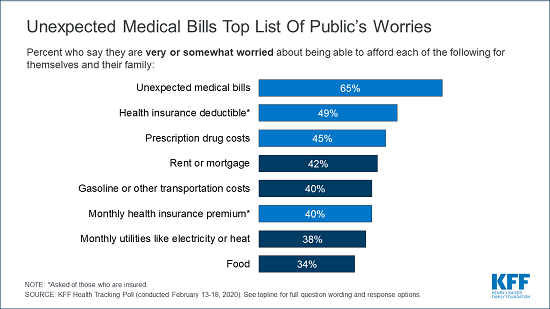
The independent source for health policy research, polling, and news.
A Polling Surprise? Americans Rank Unexpected Medical Bills at the Top of Family Budget Worries
When it comes to family budget concerns, unexpected medical bills top Americans’ list of worries, with two-thirds (65%) of the public saying they are at least somewhat worried, including 35% who say they are “very” worried, the latest KFF Health Tracking Poll finds.
Fewer Americans say they are at least somewhat worried about seven other potential family expenses, including their health insurance deductible, transportation costs including gas, prescription drug costs, their rent or mortgage, their health insurance premiums, or paying for food.
Unexpected bills do not only mean surprise bills for out-of-network care to consumers. One third of insured adults ages 18-64 (33%) say their family has received an unexpected medical bill in the past two years, including one in six (16%) who say it was because the provider was out of network.
Congress continues to weigh whether and how to protect insured patients from “surprise” medical bills, a term that often refers to unexpected bills when a patient unknowingly receives care from an out-of-network provider.
Not surprisingly, the poll finds broad support for federal action to protect patients from surprise medical bills, including situations when they are taken to an emergency room by an out-of-network ambulance (72%), when they are taken to an out-of-network hospital during a medical emergency (69%), and when they are treated by an out-of-network doctor or specialist while in an in-network hospital (67%).
At least eight in 10 Democrats and two-thirds of independents support federal action in each of these three situations. Among Republicans, about half support federal action in each situation. The polling does not speak to the policy debate about the technical details of how best to pay for surprise bills while protecting consumers.
Designed and analyzed by public opinion researchers at KFF, the poll was conducted February 13-18, among a nationally representative random digit dial telephone sample of 1,207 adults. Interviews were conducted in English and Spanish by landline (302) and cell phone (905). The margin of sampling error is plus or minus 3 percentage points for the full sample. For results based on subgroups, the margin of sampling error may be higher.
